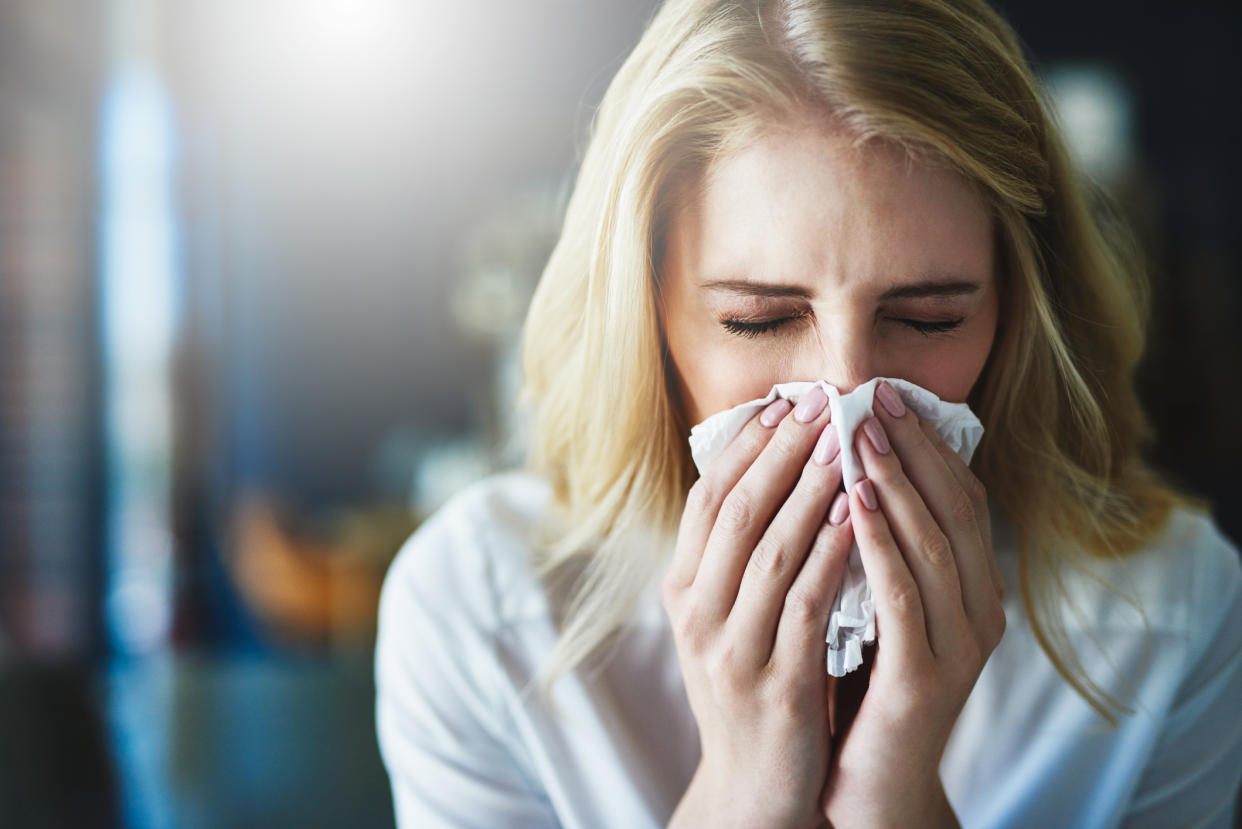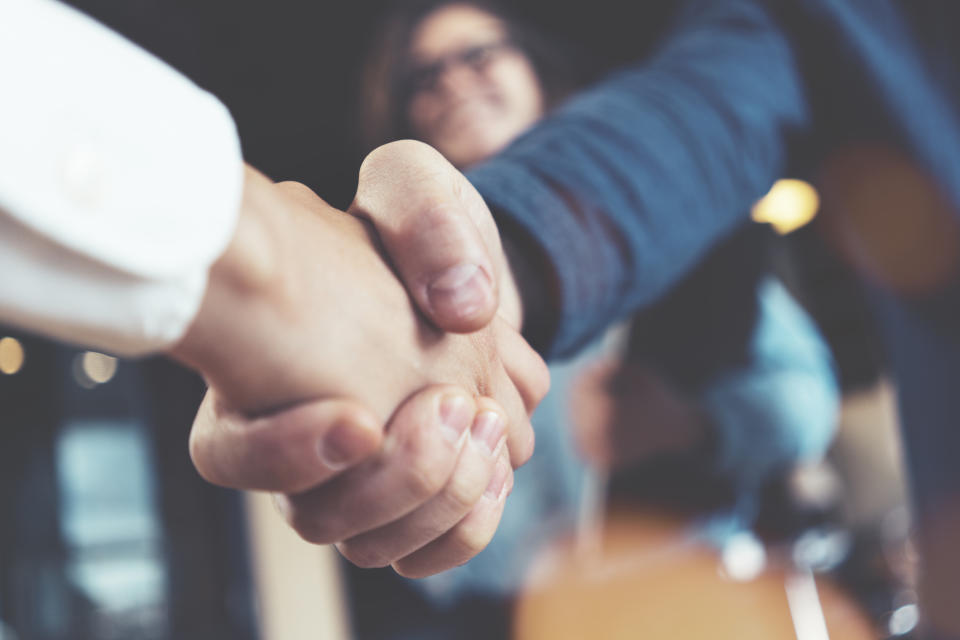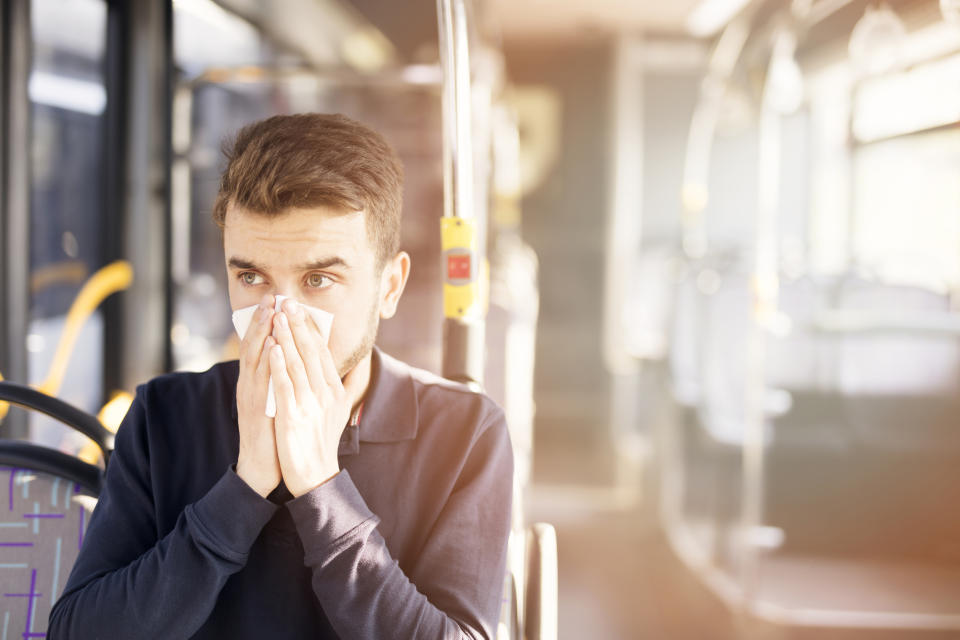Coronavirus social etiquette: Is it OK to refuse to shake someone’s hand and other dilemmas

Since the coronavirus outbreak seems to have notched up a level, you’ve been doing your best to up your social etiquette game.
Obediently coughing into tissues then binning them, trying not to touch your face, and washing your hands to the tune of ‘Happy Birthday’, twice, every time you breathe.
But what if others aren’t also sticking to the coronavirus prevention rules? Are you within your rights to pull them up on it? Is it rude to refuse to shake someone’s hand if you suspect they’ve been slacking in the hygiene department?
This week, we’ve seen experts advise new measures in the battle against coronavirus, but it is a measure that has brought fresh suspicion on our social interactions.
Dubbed ‘social distancing’, one expert recommends we keep a two-metre (6.5ft) space between a potential patient.
Under the strategy, handshaking could also be discouraged, with other, less tactile forms of greeting, such as elbow bumping, taking its place.
Read more: Coronavirus’ death rate higher than previously thought, WHO says
Earlier this week when the German chancellor, Angela Merkel, extended her hand to her interior minister, Horst Seehofer, at a meeting, he refused to shake her hand, waving it away.
Pre-coronavirus, his gesture would have been seen as the epitome of bad manners.
But, with over 93,000 cases now confirmed globally, a smiling Merkel immediately held up her hands and said: “That was the right thing to do.”
The fact is coronavirus is changing social interaction, and throwing us etiquette curveballs to deal with left, right and centre.
But for us Brits, who pride ourselves on our impeccable manners, knowing the right and wrong way to behave isn’t coming easy.
“Things are starting to ramp up and as a result we’re starting to question our normal codes of behaviour, particularly when it comes to social interactions and meeting and greeting,” explains etiquette consultant, Jo Bryant.
“As a nation we like our personal space and we don’t always greet with kisses and hugs like some of the European countries tend to do.
“Somebody shook my hand yesterday and it was the first time in my life I questioned it. So it’s fair to say it is on our radar.”
So, what alterations may we need to make to our various forms of social interaction? And can we pull someone up on their bad coronavirus etiquette?
When greeting someone hello
Sylvie Brand, the World Health Organisation’s director of pandemic disease, has endorsed some safer alternatives to shaking hands including the elbow bump, the foot-shake, waving and the “wai”, a Thai greeting involving a slight bow with the palms pressed together in prayer-like manner.
But, isn’t it rude to refuse to shake?
Bryant suggests taking control of the situation by waving hello and removing the hand shake from the equation.
“Be very friendly with lovely open positive body language rather than being ‘I’m not shaking anyone’s hand,’” she says.
According to Bryant it is all about context.
“If you’re meeting someone one to one and you’re suddenly getting your sanitising hand gel out and being very paranoid, at this stage it would possibly be seen as a bit extreme,” she explains.
“However if you’re at a conference or a business situation where there is lots and lots of hand shaking I think people would appreciate it if someone said ‘shall we just not shake hands today?’”
When we face any sort of awkward situation like this, the way to approach it is friendliness positivity and confidence, says Bryant.
“It’s when people are unconfident or a bit uncharacteristically aggressive about it, maybe because they’re nervous about saying it, that’s when people can take offence and it be rude,” she explains.
Bryant suggests that with friendly, British humour you can avoid any situation that you don’t want to have, ie a handshake, quite politely and nicely.
Read more: Could the coronavirus spread on public transport?

When you’re on the commute
It’s never pleasant sitting next to someone who’s coughing, spluttering and liberally sneezing their way through the journey, but in these coronavirus-laced times sitting next to a mouth-breather takes on a whole new fear.
So how do you deal with it?
According to Bryant we should remember that it is a two way process. “While we all have a greater responsibility not to spread germs and follow all the hygiene recommendations you also have a responsibility to yourself,” she says.
While it’s tempting to pull them up on their anti-social behaviour there and then, Bryant says its better to remove yourself from the situation.
“If you’re in an uncomfortable situation the most polite thing to do, if possible, is to get up and move away, rather than confronting someone in public,” she says.
“If you’re in a packed tube and someone is hacking and coughing, try to turn your back,” she continues.
Alternatively if they are being outrageously germ-y it wouldn’t necessarily be considered rude to bury your face in your scarf.
“Again it depends on context and degrees of behaviour,” she adds.
“The best thing is not to cause more embarrassment and rudeness by confronting someone in the wrong way.
“If you can deal with it yourself it is a much better solution, turning back, moving away, trying to avoid it yourself, but equally people need to be really aware that they need to not spread their germs.”

When someone isn’t sticking to hygiene protocol
Not binning their tissues, not coughing into their elbows, is it ok to pull people up if they’re clearly flouting the coronavirus spreading rules?
Again it depends on who’s doing the flouting.
“If it is a stranger just out and about and you can move away there’s no point,” advises Bryant. “If it’s a colleague in the office and you know them really well you could have a quiet word.
“If its someone you don’t know very well you can always go to the powers that be and suggest some official guidelines or reminders are sent out across the board.”
Bryant says this is a far more diplomatic way to handle the situation, than stomping over to confront someone on their workplace hygiene.
“People don’t generally take well to being pulled up on this stuff, particularly with the sort of atmosphere around coronavirus it’s quite an unusual sensitive thing for people.
“To be accused to being a potential spreader people aren’t likely to take to that too kindly,” she adds.
Read more: Can anti-bacterial hand sanitisers protect against the coronavirus?
When you’re about to be beaten to the last hand sanitiser in the supermarket
With reports of people stockpiling loo roll, what’s the etiquette if you and another shopper are confronted with the last packet of four?
Bryant advises we try to behave like adults and not turn the weekly shop into a black Friday scrum.
“We shouldn’t be barging people out of the way to grab the last hand sanitiser,” she says.
“Social and public manners still count even at times of unprecedented desperation. Remember who you are and how you would normally behave and approach it sensibly.”



